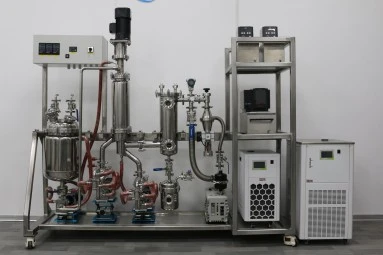What Is Molecular Distillation Equipment? Beginner's Guide
Imagine struggling to purify heat-sensitive pharmaceutical compounds that degrade under traditional distillation temperatures, losing thousands in wasted product. Molecular Distillation Equipment solves this critical challenge by enabling separation at extremely low temperatures under high vacuum conditions. This beginner's guide reveals how this advanced technology protects valuable compounds while achieving exceptional purity levels that conventional methods simply cannot match.

Understanding Molecular Distillation Equipment Technology
Molecular Distillation Equipment represents a specialized thermal separation technology operating under extremely high vacuum conditions, typically between 0.001 to 0.01 mbar. Unlike conventional distillation that relies on boiling point differences, this equipment exploits the difference in mean free path of vapor molecules. The technology enables liquid-liquid separation at temperatures significantly lower than atmospheric boiling points, making it essential for processing thermally sensitive materials that would otherwise decompose or lose their valuable properties. The fundamental principle behind Molecular Distillation Equipment involves creating conditions where the distance between the evaporating surface and condensing surface is shorter than the mean free path of molecules. This allows vapor molecules to travel directly from the heated surface to the condenser without intermolecular collisions. The equipment maintains vacuum levels as low as 0.01Pa, ensuring molecules move in free molecular flow rather than viscous flow. This breakthrough approach minimizes thermal exposure time to milliseconds, protecting compounds from degradation while achieving separation factors impossible with traditional methods.
Core Operating Principles of Distillation Systems
The mean free path principle governs how Molecular Distillation Equipment achieves superior separation performance. When pressure drops to extremely low levels in the evaporation chamber, gas molecules can travel longer distances without colliding with other molecules. The equipment design ensures that lighter, more volatile molecules with longer mean free paths reach the internal condenser, while heavier molecules with shorter paths remain in the residue. This molecular weight-based separation occurs without requiring the material to reach its atmospheric boiling point. Temperature control represents another critical operating principle in modern Molecular Distillation Equipment. The systems utilize precise heating jackets that maintain evaporating surfaces at optimal temperatures, typically 50-100°C lower than conventional distillation would require. Advanced control systems from manufacturers like ABB or SEW regulate heating rates to prevent thermal decomposition while maximizing separation efficiency. The equipment simultaneously maintains cooling systems that rapidly condense vaporized molecules, preventing re-evaporation and ensuring high recovery rates.
Key Components of Professional Equipment
Modern Molecular Distillation Equipment comprises several integrated components working in precise coordination. The evaporator body forms the heart of the system, typically constructed from 316L stainless steel for chemical resistance and durability. Inside this cylindrical chamber, a rotating shaft with wiper blades or rollers continuously spreads feed material into thin films across the heated internal wall. These wipers, manufactured from imported PTFE or graphite materials, ensure uniform film thickness while preventing buildup that could reduce separation efficiency. The vacuum system represents perhaps the most critical component, requiring sophisticated pump configurations to achieve and maintain molecular flow conditions. High-quality Molecular Distillation Equipment utilizes dual-pump arrangements combining vane vacuum pumps with turbo molecular pumps, capable of reaching pressures as low as 0.001 mbar. The internal condenser, positioned mere centimeters from the evaporating surface, provides immediate condensation surfaces for separated molecules. Cold traps protect vacuum pumps from contamination while capturing trace volatiles, and precision gear pumps control feed rates and discharge flows with variable frequency drives.
Industrial Applications Across Multiple Sectors
Pharmaceutical Industry Solutions
In pharmaceutical manufacturing, Molecular Distillation Equipment plays an indispensable role in producing high-purity active pharmaceutical ingredients and excipients. The technology excels at polyethylene glycol synthesis where microchannel reactors combined with molecular distillation achieve single molecular weight distributions impossible with traditional batch reactors. Pharmaceutical manufacturers utilize multi-stage systems to purify squalene from plant extracts, removing fatty acids and esters to achieve 98% purity levels required for medical applications. The equipment's gentle processing capabilities make it ideal for refining fermentation intermediates and plant extracts that degrade under conventional distillation temperatures. Pharmaceutical companies leverage Molecular Distillation Equipment to separate synthetic intermediates and pharmaceutical monomers while preserving their biological activity and chemical structure. The technology's ability to operate under high vacuum with minimal thermal exposure ensures that sensitive molecular structures remain intact throughout the purification process, maintaining therapeutic efficacy.
Food and Nutraceutical Processing
Food industry applications of Molecular Distillation Equipment focus primarily on purifying nutritionally valuable compounds from natural sources. Fish oil refinement represents a major application where the technology achieves 70% recovery rates of EPA and DHA compared to only 16% with traditional methods. The equipment processes crude fish oil through four-stage distillation systems, producing concentrates containing 80% combined EPA and DHA while eliminating fishy odors and peroxide compounds that compromise product quality. Tea oil deacidification demonstrates another valuable food application where Molecular Distillation Equipment outperforms conventional alkaline refining methods. The technology removes free fatty acids without damaging beneficial components or generating hazardous waste streams. Manufacturers also employ the equipment to produce high-purity monoglycerides used as emulsifiers in food products, and to concentrate valuable compounds like carotene, vitamin E, and various seed oils including walnut, seabuckthorn, and Ganoderma lucidum oils.
Advanced Materials and Chemical Industries
New materials industries rely on Molecular Distillation Equipment for purifying specialized polymers and resins that serve critical functions in electronics and coatings. Epoxy resin purification through two-stage molecular distillation removes low-boiling impurities in the first stage while separating light and heavy components in the second stage, ultimately producing low total chlorine epoxy resins with exceptional purity. These refined materials find applications in OLED displays, battery additives, and advanced adhesive formulations. The petrochemical sector employs Molecular Distillation Equipment extensively for lubricating oil regeneration and processing. Multi-stage systems separate waste lubricating oil into multiple high-quality base oil fractions with different viscosity properties, achieving resource recovery while eliminating environmental pollution from disposal. The technology processes polyol coolants, silicone oils, and high-temperature heat transfer oils, separating valuable components from degraded additives and contaminants through gentle, low-temperature distillation cycles.
Technical Specifications and Performance Parameters
Professional Equipment Configuration
High-performance Molecular Distillation Equipment like the WMD-30 model exemplifies modern system capabilities with its 0.3 square meter evaporation area and 0.75 square meter internal condenser area. The equipment features a 210mm internal diameter evaporator rotating at speeds up to 350 rpm, creating optimal thin-film conditions for efficient separation. Magnetic sealing technology eliminates shaft seal contamination risks while maintaining vacuum integrity even during continuous operation at pressures below 0.001 mbar. The heating and cooling systems in professional Molecular Distillation Equipment demonstrate sophisticated thermal management capabilities. Main evaporator heaters provide up to 300°C temperatures with 10kw power and 35L/min circulation rates, while material insulation systems maintain process temperatures up to 200°C. The internal condenser system operates across a remarkable temperature range from -20°C to 200°C with 4.5kw heating and 7.5kw cooling capacity. External condensers reach temperatures as low as -80°C using specialized chillers, ensuring complete vapor capture and maximum product recovery.
Quality Certifications and Standards
Leading Molecular Distillation Equipment manufacturers maintain comprehensive certification portfolios demonstrating compliance with international safety and quality standards. CE certification confirms conformity with European Union safety, health, and environmental protection requirements. ISO quality management system certification validates consistent manufacturing processes and product quality control. UL listing ensures electrical components meet rigorous North American safety standards through extensive testing of motors, frequency converters, and control systems. ATEX certification qualifies Molecular Distillation Equipment for use in potentially explosive atmospheres, critical for processing volatile organic compounds in pharmaceutical and chemical applications. GMP standard compliance ensures equipment design and construction meet pharmaceutical manufacturing requirements for contamination control and product purity. Manufacturers holding over 30 product patents demonstrate innovation leadership and technical expertise in molecular distillation technology development. These certifications provide customers confidence that their Molecular Distillation Equipment investment meets stringent regulatory requirements across global markets.
Selection Guide for Optimal Equipment
Matching Capacity to Production Requirements
Selecting appropriate Molecular Distillation Equipment begins with accurately assessing throughput requirements and production scale. Laboratory-scale systems with 0.1-0.5 square meter evaporation areas suit research and development applications, enabling process optimization and product qualification with minimal material consumption. Pilot-scale equipment ranging from 0.5-2 square meters bridges laboratory findings to commercial production, validating scale-up parameters while producing sufficient quantities for market testing and regulatory submissions. Industrial-scale Molecular Distillation Equipment with evaporation areas exceeding 2 square meters delivers production volumes meeting commercial demand. Multi-stage continuous systems connect multiple distillation units in series, enabling fraction cutting and achieving higher purities through sequential separation stages. Manufacturers offering single-stage, dual-stage, and three-stage configurations provide flexibility to optimize separation performance for specific applications. Consider future expansion needs when sizing equipment, as modular designs allow capacity increases through parallel unit installation.
Critical Features for Different Applications
Heat-sensitive pharmaceutical applications demand Molecular Distillation Equipment with precise temperature control and rapid thermal response. Look for systems featuring high-quality heating circulators from established brands, programmable temperature profiles, and automated process control preventing overheating incidents. Multiple independent heating zones enable optimization of evaporator, condenser, and material transfer temperatures for specific compounds. Safety interlocks should automatically shut down heating if vacuum loss occurs, protecting valuable materials from thermal degradation. Corrosive chemical processing requires Molecular Distillation Equipment constructed entirely from 316L stainless steel or specialized alloys resistant to aggressive compounds. Examine wetted component materials including gaskets, seals, and valve seats, ensuring compatibility with process chemistry. High-viscosity materials necessitate robust wiper systems with adjustable blade pressure and sufficient motor torque maintaining film formation under challenging conditions. For volatile solvent recovery applications, prioritize systems with oversized cold traps and condensers preventing vacuum pump contamination while maximizing solvent capture efficiency.
Advantages Over Conventional Separation Methods
Molecular Distillation Equipment delivers transformative advantages for processing heat-sensitive and high-molecular-weight compounds compared to traditional separation technologies. The ultra-low operating temperatures, typically 50-150°C below atmospheric boiling points, preserve thermally labile compounds that would decompose during conventional distillation. Residence times measured in seconds rather than hours minimize thermal exposure, protecting product quality while improving yields. The complete absence of oxidizing atmosphere under high vacuum prevents oxidative degradation of unsaturated compounds and free radical formation. Economic benefits complement technical performance advantages when implementing Molecular Distillation Equipment in production operations. Higher product yields translate directly to improved raw material utilization and reduced waste disposal costs. The elimination of chemical extractants and solvents required by alternative purification methods reduces operating costs and environmental compliance burdens. Single-pass separation of complex mixtures reduces processing steps compared to multi-stage conventional distillation or chromatography. Energy efficiency results from low operating temperatures and absence of reflux requirements, cutting utility consumption significantly compared to traditional distillation columns.
Conclusion
Molecular Distillation Equipment represents an essential technology for industries requiring high-purity separation of heat-sensitive compounds. Operating under extreme vacuum conditions with minimal thermal exposure, this equipment achieves separation performance impossible with conventional methods. From pharmaceutical synthesis to food purification and advanced materials processing, Molecular Distillation Equipment delivers superior product quality, higher yields, and environmental benefits across diverse applications.
Cooperate with Xi'an Well One Chemical Technology Co., Ltd
Since 2006, Xi'an Well One Chemical Technology Co., Ltd., backed by Xi'an NewSet Chemical Equipment Technology Co., Ltd., has specialized in synthesis and purification separation equipment with 17 years of manufacturing excellence. Our 1,500 square meter office, 500 square meter R&D laboratory, and 4,500 square meter factory in Sanyuan Precision Equipment Industrial Park deliver comprehensive process development, equipment design, testing, and pilot services. Our expert team provides molecular distillation devices from laboratory to industrial scale, ensuring production capacity and quality through over 50 successful application cases.
Premium Quality: Selected 316L stainless steel materials and imported PTFE components ensure top-grade products meeting international standards. Our equipment features ABB or SEW control systems, KingLai vacuum ball valves, and achieves vacuum degrees as low as 0.01Pa.
OEM & ODM Excellence: Custom designs with 3D animation modeling enable tailored solutions for unique applications. We supply single-stage, dual-stage, and three-stage configurations optimized for your specific separation requirements.
Comprehensive Service: From R&D and production to sales and 12-month warranty support, we provide complete solutions across pharmaceutical, food, new materials, petrochemical, essence, and fine chemicals industries.
Own Factory Advantage: Our 5,000 square meter facility houses CNC machining centers, processing machines, and assembly lines producing equipment certified with CE, ISO, UL, and ATEX standards. We hold over 30 patents demonstrating technical leadership as a China Molecular Distillation Equipment factory, China Molecular Distillation Equipment supplier, and China Molecular Distillation Equipment manufacturer. Contact our China Molecular Distillation Equipment wholesale team for High Quality Molecular Distillation Equipment pricing and Molecular Distillation Equipment for sale information.
Transform your purification processes with molecular distillation technology. Bookmark this guide for reference when evaluating equipment options. Ready to discuss your specific application requirements? Email info@welloneupe.com today for expert consultation and competitive Molecular Distillation Equipment price quotations from an industry-leading manufacturer.
References
1. Batistella CB, Wolf Maciel MR. "Molecular Distillation Process for Recovering Biodiesel and Carotenoids from Palm Oil." Chemical Engineering Research and Design.
2. Lutisan J, Cvengros J. "Mean Free Path of Molecules on Molecular Distillation." Chemical Engineering Journal.
3. Hickman KC. "High-Vacuum Short-Path Distillation: A Review." Chemical Reviews.
4. Martini S, Anklam E. "Potential Use of Short-Path Distillation for the Concentration of Minor Compounds in Fats and Oils." Journal of the American Oil Chemists' Society.



